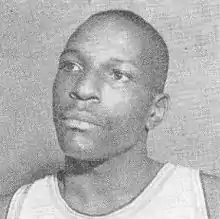Andy Johnson (basketball)
Andrew Johnson Jr. (November 8, 1932 – August 30, 2002)[1] was an American professional basketball player.
 Johnson circa 1962 | |
| Personal information | |
|---|---|
| Born | November 8, 1932 Los Angeles, California |
| Died | August 30, 2002 (aged 69) |
| Nationality | American |
| Listed height | 6 ft 5 in (1.96 m) |
| Listed weight | 215 lb (98 kg) |
| Career information | |
| High school | North Hollywood (North Hollywood, California) |
| College | Portland (1950–1953) |
| Position | Power forward / Small forward |
| Number | 12 |
| Career history | |
| 1958–1961 | Philadelphia Warriors |
| 1961–1962 | Chicago Packers |
| Career highlights and awards | |
| |
| Stats at Basketball-Reference.com | |
A 6'5" guard/forward, Johnson played at the University of Portland in the 1950s before serving with the US military in the Korean War. He began his professional basketball career with the Harlem Globetrotters, then played in the NBA from 1958 to 1962 as a member of the Philadelphia Warriors and Chicago Packers. He averaged 9.8 points over his NBA career, posting a high of 14.3 points per game with the Packers in the 1961-62 season.[2]
To Johnson's surprise, he was cut by Chicago before the 1962-63 season began, allegedly because he "didn't know the plays". He then joined the Philadelphia Tapers of the American Basketball League. Johnson hoped to return to the NBA after a season with the Tapers, but such an opportunity never materialized, and he played five more years in the Eastern Basketball Association. Because he had been cut by the Chicago Packers before his fifth NBA season, he did not qualify for a pension from the NBA,[2] though after some effort, he managed to receive some money from them later in his life.[3]
Johnson is the subject of a 2010 biography called Basketball Slave. The book was written by his son, Mark, who believed his father had been exploited throughout his athletic career on account of his ethnicity.[3]
References
- Known deceased basketball individuals. APBR.org. Retrieved on December 26, 2009.
- George Vecsey. "Tracing The Old Survivors". New York Times. December 12, 1990. Retrieved on December 26, 2009.
- "Books". SLAM. February 2010. 80-81.